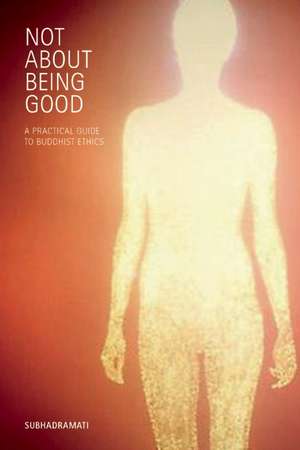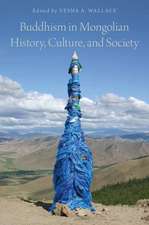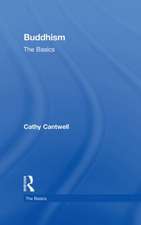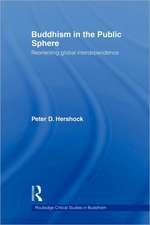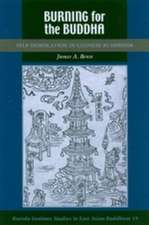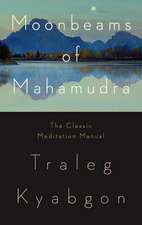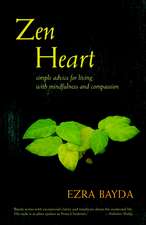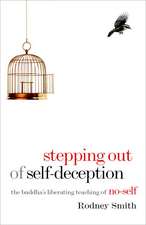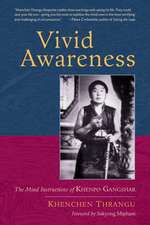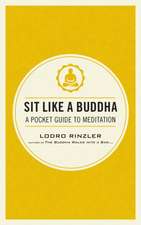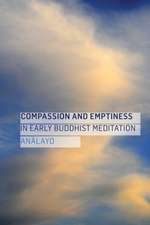Not about Being Good: A Practical Guide to Buddhist Ethics
Autor Subhadramatien Limba Engleză Paperback – 25 iul 2013
While there are numerous books on Buddhist meditation and philosophy, there are few books that are entirely devoted to the practice of Buddhist ethics. Here Subhadramati, an experienced teacher of meditation and ethics, communicates clearly both their founding principles and the practical methods to embody them. She begins by stating that Buddhist ethics don't see human nature as something to be beaten into submission, tamed, or domesticated. Buddhism is not trying "to cure life of itself." Buddhism is about fulfilling our human nature, not diminishing it, and its ethics are both the means and the expression of this fulfillment. In Buddhism, being ethical means being truly human.
Buddhist ethics are thus not about conforming to a set of conventions, not about "being good" in order to gain material, social, or religious rewards. Instead, as Subhadramati outlines, living ethically springs from the awareness that other people are essentially no different from ourselves. We can, if we choose, actively develop this awareness, through cultivating more and more love, clarity, and contentment. Helping us to come into a greater harmony with all that lives, including ourselves, this is ultimately a guidebook to a more satisfactory life.
Subhadramati is a teacher of meditation and Buddhism at the London Buddhist Centre. This is her first book.
Buddhist ethics are thus not about conforming to a set of conventions, not about "being good" in order to gain material, social, or religious rewards. Instead, as Subhadramati outlines, living ethically springs from the awareness that other people are essentially no different from ourselves. We can, if we choose, actively develop this awareness, through cultivating more and more love, clarity, and contentment. Helping us to come into a greater harmony with all that lives, including ourselves, this is ultimately a guidebook to a more satisfactory life.
Subhadramati is a teacher of meditation and Buddhism at the London Buddhist Centre. This is her first book.
Preț: 76.57 lei
Nou
Puncte Express: 115
Preț estimativ în valută:
14.65€ • 15.30$ • 12.13£
14.65€ • 15.30$ • 12.13£
Carte disponibilă
Livrare economică 14-28 martie
Livrare express 27 februarie-05 martie pentru 22.13 lei
Preluare comenzi: 021 569.72.76
Specificații
ISBN-13: 9781909314016
ISBN-10: 1909314013
Pagini: 156
Ilustrații: black & white illustrations
Dimensiuni: 155 x 231 x 13 mm
Greutate: 0.3 kg
Editura: Windhorse Publications (UK)
ISBN-10: 1909314013
Pagini: 156
Ilustrații: black & white illustrations
Dimensiuni: 155 x 231 x 13 mm
Greutate: 0.3 kg
Editura: Windhorse Publications (UK)
Notă biografică
Subhadramati is a teacher of meditation and Buddhism at the London Buddhist Center. This is her first book.
Extras
Introduction: Not About Being Good (excerpt)
By Subhadramati
The big questions
As a child I used to go to chapel a lot. As well as morning mass on Sunday, I went to rosary and benediction on Sunday evenings, mass every morning before school, and confession on Saturdays. But I’d often go on my own too, when there was no service being conducted, not so much to pray as to reflect, with all the intensity that was particular to eleven-year-old catholic girls. I was going through a phase of trying to imagine what Heaven was like - I can still see exactly which pew I was kneeling in, the one next to my favourite Station of the Cross, where Veronica wipes the face of Jesus - when I was suddenly overwhelmed by the thought that God was just an invention by humans to explain things they didn’t yet understand. I was dismayed by the intrusion of this thought. I tried hard to push it away as I could feel the very structure of everything I’d built my whole inner life around crumbling away. But I was powerless in the face of it. After that I still went to chapel but it was half-heartedly and as I entered my teens I turned away from religion altogether, and towards science, reckoning that if God had just been an explanation for everything in the universe that wasn’t understood, then surely science particularly the study of physics, would be a better bet. I put my hopes on science to provide me with the answers to questions which all began with the word ‘Why?’ But after four years at university, although I now had an honours degree in ‘Natural Philosophy’ (as the study of pure physics was called in Scottish universities), and could get my head around mathematical formulae, a single one of which could fill half this page, I was just another mixed-up twenty-one-year old. I put my lack of finding ‘answers’ to just not being clever enough. But when, a year or so later, I met my first Buddhist guides I became significantly clearer about the questions I was seeking answers for. Rather than focusing on why the universe is as it is, the crucial issue became how I should live my life within it. Looking back I see that I wasn’t actually looking for answers to life at all. I was looking for meaning in life.
The immediate appeal to me of this new ‘how-to’ based approach was that (in theory at least) no matter how confused my mind, or how turbulent my emotions, there was always something I could do; it was a practical, hands-on approach. But, even more than that, as I began to follow the Buddhist teachings that were offered, I began to see that wisdom was not something you can think about in abstract or even metaphysical terms; nor was it something you could ‘have’ – no matter how fervently you think or how clever you are. I began to see that wisdom encompassed your concretely lived attitudes, your behaviour.
This is a book about concretely-lived attitudes and behaviour. It is a book about Buddhist ethics. My own Buddhist teacher, Sangharakshita, has written and taught about Buddhist ethics over many years, and one of my main aims in writing this book is to bring together some of those teachings from different sources - books, lectures and unpublished study seminars - that have helped and inspired me, in the hope that they will inspire you as well. But as well as exploring the spirit of the Buddhist approach to ethics, this book is an attempt to be a practical guide to them.
There’s a Buddhist story of a monk who lives in the mountains. Every so often he comes down to the market place. One day a rather arrogant stall-holder disparagingly asks, ‘What on earth do you do up there in the mountains all day?’ The monk, unphased, smiles and says, ‘In the mountains it is very beautiful, there are wild forests to roam in and clear lakes to swim in. But I can’t bring those forests and lakes down to you; you’ll have to come up the mountain and see for yourself’. The monk of course is talking about the inner joy he dwells in by living the renunciate’s life; it has to be experienced first-hand. It’s the same with this book. I can perhaps give you a glimpse of my own inspiration and enthusiasm for Buddhist practice, particularly the practice of Buddhist ethics. But to really know where Buddhist ethics are pointing to, means to try them out for yourself. Throughout the book I’ve made suggestions for reflections and suggestions for practical exercises in your everyday life. It’s these that will be the real teachers; these, if you’re up for giving them a go, that will allow you to ‘see for yourself’.
A truly human life
The trouble with writing a book about ethics, compared with say, a book on meditation or insight, is that people often already have strong associations with the concept of ethics - and these are often negative.
The way we think of ethics can be a bit like the story the main character, David Lurie, tells in J. M. Coetzee’s novel, Disgrace . It’s the story of a dog, a male golden retriever, which whenever there was a bitch in the vicinity would get excited and unmanageable – and then the owners would beat it. This went on until the poor dog didn’t know what to do. Eventually even at the smell of a bitch it would chase round the garden with its tail between its legs. It didn’t even need to be beaten; it was ready to punish itself. It had become afraid of – and to hate - its own nature. Lurie’s daughter asks wouldn’t it have been better if the owners had just castrated the dog, which makes Lurie despair even more. He thought the dog would have preferred to be shot rather than having the option of either denying its own nature or else being ‘fixed’ and spending the rest of its life padding about the living room.
If we think ethics is going to be like that, that is having to keep our own nature under control, or even worse having to be ‘castrated’ in order to conform to someone else’s idea of ‘good behaviour’ imposed upon us and kept in place by a system of reward and punishment (more punishment than reward for the poor dog it seems) then no wonder we’ll have negative associations.
But Buddhist ethics is very far from the kind of system which has got nothing to do very much with human nature, which in fact makes us suspicious of our own natures, and calls on us to distort our own natures. Buddhist ethics doesn’t see human nature as something that has to be beaten into submission, tamed or domesticated. Buddhism is not trying, ‘to cure life of itself’ . Buddhism is about fulfilling our human nature, not diminishing or even crippling it, and ethics is both part of the means to that fulfillment, and the expression of that fulfillment. In Buddhism, being ethical means being truly human. It means learning to act more and more in accordance with our values. As you probably know, the word ethics comes from the Greek ‘ethos’ which in modern English can mean ‘the character of an individual as represented by his or her values and beliefs’. It might seem strange that we have to learn to act in accordance with our values. But sometimes we do not even know what our own values are because they have got mixed up with the values of some authority or perceived authority or mixed up with ‘conventional ethics’- those rules about how we should behave that are mainly about conforming to what is normal in a particular culture, rather than about fundamental human values. Society itself then becomes the ‘authority’ persuading us to conform by rewarding us when we do, and by punishing us when we don’t, usually by the approval or disapproval of the people around us, and the trouble is, because ‘conventional ethics’ are so widely accepted by everyone around, it is easy to take them on unthinkingly. But because, by definition, they will differ from place to place and time to time, you can suddenly spot them when you make friends with people from different cultures or class or religious backgrounds to our own, and you realize that it isn’t ‘intrinsically wrong’ for a girl to whistle or to laugh in a place of worship.
In practising Buddhist ethics, the person practising, if it really is Buddhist ethics they are practising, is continually guarding against a degeneration into ‘conventional ethics’, or ‘conventional morality’, and instead trying to cultivate a deeper and deeper sense of ‘natural morality’. Natural morality has as its source, and springs out of the awareness, or intuition, that other people are essentially no different from ourselves. They, like us, have hopes, fears, people they care about, and a desire to be fulfilled in life. Crucially Buddhism acknowledges that the potential for this awareness is part of the structure of consciousness – it’s what we call conscience. The fact that Buddhist morality bases itself on this, means that the teachings of Buddhism are not there to generate our moral sense but to lead it out, to educate it.
The teachings are necessary because although they’re innate, our ethical impulses are competing with our other impulses, or they get hidden by or mixed up with ‘conventional ethics’, or they get reduced or ‘blunted’, or they even get buried when we allow the opposite tendencies to develop by making certain choices or finding (or putting) ourselves in certain conditions.
This is quite different from the message we often hear in ‘religious’ arguments, which is that without a framework made up of absolute standards there can be no genuine moral conduct ( even although it isn’t hard to observe that not all religious people are good and not all good people are religious).
Ethics, meditation, wisdom
In practice, in the West at least, most people’s initial contact with Buddhism is from coming along to a Buddhist centre to learn to meditate. Many, at least at first, have no more than a passing interest in Buddhism. Others are quite definitely wary about anything that smacks of ‘organized religion’; this was certainly true of me at first.
Now, however, I teach meditation on Wednesday evenings at our drop-in class at the London Buddhist Centre. We run classes all week, all year; whether it’s the school holidays or Christmas time. We ran them during the week of the UK riots in 2011 when the local shops barricaded their windows and police sirens wailed outside the shrine-room. And we ran them during the weeks of the London Olympics in 2012, when strangers got into conversations with each other in the parks. Before I say anything about meditation I usually ask the people in the class what’s motivated them to come along. And invariably, whatever time of year it is, whatever’s going on outside, whatever news is in the papers, I get a similar set of responses to my question. Very occasionally someone says they have come to explore the spiritual dimension of life. Now and then there may be someone who has inkling that meditation might help stop her getting so annoyed with her boss all the time. Nearly always someone will shyly admit that they’ve heard meditation can help with anxiety or depression, and several others will nod. But most of the people, most of the time, say they want to reduce stress, to feel calmer; to learn how to quieten their minds, especially amidst the frenetic pace of living in a big city.
By Subhadramati
The big questions
As a child I used to go to chapel a lot. As well as morning mass on Sunday, I went to rosary and benediction on Sunday evenings, mass every morning before school, and confession on Saturdays. But I’d often go on my own too, when there was no service being conducted, not so much to pray as to reflect, with all the intensity that was particular to eleven-year-old catholic girls. I was going through a phase of trying to imagine what Heaven was like - I can still see exactly which pew I was kneeling in, the one next to my favourite Station of the Cross, where Veronica wipes the face of Jesus - when I was suddenly overwhelmed by the thought that God was just an invention by humans to explain things they didn’t yet understand. I was dismayed by the intrusion of this thought. I tried hard to push it away as I could feel the very structure of everything I’d built my whole inner life around crumbling away. But I was powerless in the face of it. After that I still went to chapel but it was half-heartedly and as I entered my teens I turned away from religion altogether, and towards science, reckoning that if God had just been an explanation for everything in the universe that wasn’t understood, then surely science particularly the study of physics, would be a better bet. I put my hopes on science to provide me with the answers to questions which all began with the word ‘Why?’ But after four years at university, although I now had an honours degree in ‘Natural Philosophy’ (as the study of pure physics was called in Scottish universities), and could get my head around mathematical formulae, a single one of which could fill half this page, I was just another mixed-up twenty-one-year old. I put my lack of finding ‘answers’ to just not being clever enough. But when, a year or so later, I met my first Buddhist guides I became significantly clearer about the questions I was seeking answers for. Rather than focusing on why the universe is as it is, the crucial issue became how I should live my life within it. Looking back I see that I wasn’t actually looking for answers to life at all. I was looking for meaning in life.
The immediate appeal to me of this new ‘how-to’ based approach was that (in theory at least) no matter how confused my mind, or how turbulent my emotions, there was always something I could do; it was a practical, hands-on approach. But, even more than that, as I began to follow the Buddhist teachings that were offered, I began to see that wisdom was not something you can think about in abstract or even metaphysical terms; nor was it something you could ‘have’ – no matter how fervently you think or how clever you are. I began to see that wisdom encompassed your concretely lived attitudes, your behaviour.
This is a book about concretely-lived attitudes and behaviour. It is a book about Buddhist ethics. My own Buddhist teacher, Sangharakshita, has written and taught about Buddhist ethics over many years, and one of my main aims in writing this book is to bring together some of those teachings from different sources - books, lectures and unpublished study seminars - that have helped and inspired me, in the hope that they will inspire you as well. But as well as exploring the spirit of the Buddhist approach to ethics, this book is an attempt to be a practical guide to them.
There’s a Buddhist story of a monk who lives in the mountains. Every so often he comes down to the market place. One day a rather arrogant stall-holder disparagingly asks, ‘What on earth do you do up there in the mountains all day?’ The monk, unphased, smiles and says, ‘In the mountains it is very beautiful, there are wild forests to roam in and clear lakes to swim in. But I can’t bring those forests and lakes down to you; you’ll have to come up the mountain and see for yourself’. The monk of course is talking about the inner joy he dwells in by living the renunciate’s life; it has to be experienced first-hand. It’s the same with this book. I can perhaps give you a glimpse of my own inspiration and enthusiasm for Buddhist practice, particularly the practice of Buddhist ethics. But to really know where Buddhist ethics are pointing to, means to try them out for yourself. Throughout the book I’ve made suggestions for reflections and suggestions for practical exercises in your everyday life. It’s these that will be the real teachers; these, if you’re up for giving them a go, that will allow you to ‘see for yourself’.
A truly human life
The trouble with writing a book about ethics, compared with say, a book on meditation or insight, is that people often already have strong associations with the concept of ethics - and these are often negative.
The way we think of ethics can be a bit like the story the main character, David Lurie, tells in J. M. Coetzee’s novel, Disgrace . It’s the story of a dog, a male golden retriever, which whenever there was a bitch in the vicinity would get excited and unmanageable – and then the owners would beat it. This went on until the poor dog didn’t know what to do. Eventually even at the smell of a bitch it would chase round the garden with its tail between its legs. It didn’t even need to be beaten; it was ready to punish itself. It had become afraid of – and to hate - its own nature. Lurie’s daughter asks wouldn’t it have been better if the owners had just castrated the dog, which makes Lurie despair even more. He thought the dog would have preferred to be shot rather than having the option of either denying its own nature or else being ‘fixed’ and spending the rest of its life padding about the living room.
If we think ethics is going to be like that, that is having to keep our own nature under control, or even worse having to be ‘castrated’ in order to conform to someone else’s idea of ‘good behaviour’ imposed upon us and kept in place by a system of reward and punishment (more punishment than reward for the poor dog it seems) then no wonder we’ll have negative associations.
But Buddhist ethics is very far from the kind of system which has got nothing to do very much with human nature, which in fact makes us suspicious of our own natures, and calls on us to distort our own natures. Buddhist ethics doesn’t see human nature as something that has to be beaten into submission, tamed or domesticated. Buddhism is not trying, ‘to cure life of itself’ . Buddhism is about fulfilling our human nature, not diminishing or even crippling it, and ethics is both part of the means to that fulfillment, and the expression of that fulfillment. In Buddhism, being ethical means being truly human. It means learning to act more and more in accordance with our values. As you probably know, the word ethics comes from the Greek ‘ethos’ which in modern English can mean ‘the character of an individual as represented by his or her values and beliefs’. It might seem strange that we have to learn to act in accordance with our values. But sometimes we do not even know what our own values are because they have got mixed up with the values of some authority or perceived authority or mixed up with ‘conventional ethics’- those rules about how we should behave that are mainly about conforming to what is normal in a particular culture, rather than about fundamental human values. Society itself then becomes the ‘authority’ persuading us to conform by rewarding us when we do, and by punishing us when we don’t, usually by the approval or disapproval of the people around us, and the trouble is, because ‘conventional ethics’ are so widely accepted by everyone around, it is easy to take them on unthinkingly. But because, by definition, they will differ from place to place and time to time, you can suddenly spot them when you make friends with people from different cultures or class or religious backgrounds to our own, and you realize that it isn’t ‘intrinsically wrong’ for a girl to whistle or to laugh in a place of worship.
In practising Buddhist ethics, the person practising, if it really is Buddhist ethics they are practising, is continually guarding against a degeneration into ‘conventional ethics’, or ‘conventional morality’, and instead trying to cultivate a deeper and deeper sense of ‘natural morality’. Natural morality has as its source, and springs out of the awareness, or intuition, that other people are essentially no different from ourselves. They, like us, have hopes, fears, people they care about, and a desire to be fulfilled in life. Crucially Buddhism acknowledges that the potential for this awareness is part of the structure of consciousness – it’s what we call conscience. The fact that Buddhist morality bases itself on this, means that the teachings of Buddhism are not there to generate our moral sense but to lead it out, to educate it.
The teachings are necessary because although they’re innate, our ethical impulses are competing with our other impulses, or they get hidden by or mixed up with ‘conventional ethics’, or they get reduced or ‘blunted’, or they even get buried when we allow the opposite tendencies to develop by making certain choices or finding (or putting) ourselves in certain conditions.
This is quite different from the message we often hear in ‘religious’ arguments, which is that without a framework made up of absolute standards there can be no genuine moral conduct ( even although it isn’t hard to observe that not all religious people are good and not all good people are religious).
Ethics, meditation, wisdom
In practice, in the West at least, most people’s initial contact with Buddhism is from coming along to a Buddhist centre to learn to meditate. Many, at least at first, have no more than a passing interest in Buddhism. Others are quite definitely wary about anything that smacks of ‘organized religion’; this was certainly true of me at first.
Now, however, I teach meditation on Wednesday evenings at our drop-in class at the London Buddhist Centre. We run classes all week, all year; whether it’s the school holidays or Christmas time. We ran them during the week of the UK riots in 2011 when the local shops barricaded their windows and police sirens wailed outside the shrine-room. And we ran them during the weeks of the London Olympics in 2012, when strangers got into conversations with each other in the parks. Before I say anything about meditation I usually ask the people in the class what’s motivated them to come along. And invariably, whatever time of year it is, whatever’s going on outside, whatever news is in the papers, I get a similar set of responses to my question. Very occasionally someone says they have come to explore the spiritual dimension of life. Now and then there may be someone who has inkling that meditation might help stop her getting so annoyed with her boss all the time. Nearly always someone will shyly admit that they’ve heard meditation can help with anxiety or depression, and several others will nod. But most of the people, most of the time, say they want to reduce stress, to feel calmer; to learn how to quieten their minds, especially amidst the frenetic pace of living in a big city.
Descriere
A teacher of meditation and ethics, Subhadramati gives us the principles and practical guidelines of Buddhist ethics.
